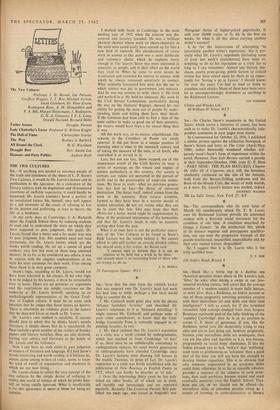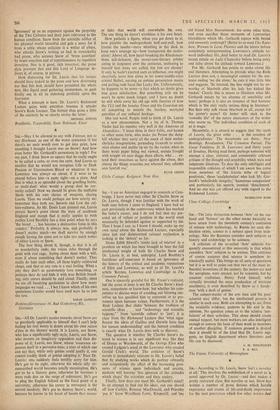SIR,—Stuck like a bottle top in a dustbin one rhetorical
question shines dimly in Dr. Leavis's text. 'Who,' he asks, after taking a swipe at our jam- smeared working classes, 'will assert that the average member of a modern society is more fully human, or more alive, than a Bushman, an Indian peasant or one of those poignantly surviving primitive peoples with their marvellous art and skills and their vital intelligence?' I will so assert, for if this tarnished romantick little concept dredged from Jean Jacques Rousseau represents part of the lofty thinking of the 'essential Cambridge' then he is in no position to accuse C. P. Snow of ignorance. If you, like the Bushman, spend your life desperately trying to stay alive and are in fact dying out, however poignantly, because your marvellous skills are inadequate, then you are less alive and, horrible as it is, less human, progressively as 'social hope' diminishes. If like the Indian peasant you so lack 'welfare' that 'wellbeing' must seem as posthumous as 'salvation' then a good deal of the time you will not have the strength to develop human capacities. This is so obvious that only someone sequestered in an academic niche could think otherwise. In so far as scientific advance provides a measure of the solution to such prob- lems, then such problems become urgent and must eventually penetrate even the English School. They have not yet, or we should not be offered the marvellous skills of primitive peoples either as a sample of learning, in contradistinction to Snow's
'ignorance or as an argument against the propriety of the Two Cultures and their joint relevance to the human condition. Snow finds the scientific edifice of the physical world beautiful and gets a sneer for it from a critic whose criticism is a welter of abuse, who attacks Snow's writing as bad in remarkably bad prose, who accuses Snow of 'brute assertion' by brute assertion and of repetitiousness by repetitive invective. Nor is it good, rich invective; the prose style prevents that and this Lord of Language de- livers it, of course, in private.
How distressing for Dr. Leavis that his lecture should have leaked to the press and how distressing too that this leak should have permitted the whole text, like liquid mud gathering momentum, to gush finally out in all its sickening prolixity opon the Spectator. What a triumph is here. Dr. Leavis's Richmond Lecture gains wide attention because it attacks Snow's Redc Lecture. The former thus gains a little of the celebrity he so clearly envies the latter.
MICHAEL AYRTON
Bradfields, Toppesfield, Near Halstead, Essex



































 Previous page
Previous page